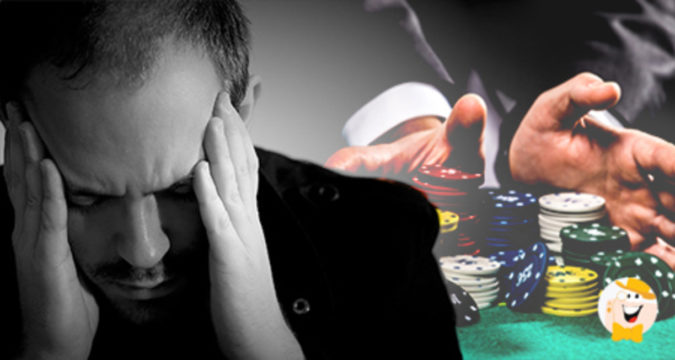
For a lot of people, gambling is nothing but some harmless fun that you indulge in occasionally. However, it can become a problem when it turns into gambling addiction, a kind of impulse-control disorder where you have little or absolutely no control over the urge to gamble. People are unable to stop, even though they are fully aware that their actions can hurt themselves and others. They cannot hold back, even when they know that the odds are against them. Most people start gambling because of an underlying issue. It could be due to unresolved issues in a relationship, alcohol or drug addiction, stress because of problems at work or a form of escapism from any difficult emotional period in your life.
Experiencing a constant urge to gamble, even when you are facing a difficult financial situation, or gambling as a way to resolve financial difficulties are some common symptoms of a gambling addiction. As a matter of fact, there are also some fundamental emotional reasons that can often result in the vicious cycle of compulsive gambling. These include:
- Visiting casinos or betting shops as a way to overcome social isolation
- For feeling a rush of adrenaline and release of a brain chemical called ‘dopamine’ that makes you happy
- For suppressing and numbing unpleasant problems or feelings that cannot be resolved
- To eliminate boredom and pass your time
- For relaxing and unwinding after a stressful day
These emotional factors are known to contribute to a gambling addiction in people, but how do you spot an addiction? Listed below are some visible symptoms and signs of a gambling problem:
- Becoming preoccupied with gambling and losing interest in other areas of your life is a symptom of gambling. You will start ignoring your responsibilities and only focus on the outcome of your gambling activities.
- Needing more money to gamble for paying your lost bets and for experiencing the same thrill and level of excitement as before.
- Loss of control and not being able to manage the impulsive urge to gamble, even when you are aware that the odds are against you.
- Concealing the amount of time and money spent on gambling from your family members. The secrecy involved in a gambling addiction can lead to lack of trust in relationships and often cause additional problems at home.
- Not going to work, taking offs or just deserting work in the middle of the day because you experience the urge to gamble and are unable to maintain control.
- Neglecting your expenses and bills and using the money for them to gamble.
- Unable to stop yourself from taking bigger and bigger risks in gambling, even though you may not have the money to pay in case you lose.
- Constantly denying that you have a gambling problem, which is a great concern because accepting you have a problem is the first step to recovery.
Along with these symptoms, people with a gambling addiction also obsess over any type of gambling activity because they are unable to help themselves. They often gamble in order to feel better about life, as they are able to forget their problems for a little while. The addiction can also get so severe that gambling addicts start selling their possessions to get money for gambling and they may even resort to stealing to keep up their habit. Likewise, they will lie through their teeth about their gambling habit, but will also feel guilty after a gambling session.
Getting Help
The good news is that with the right treatment, it is possible to manage a gambling addiction. Unlike people with a food addiction, you don’t have to have the object of your addiction in order to survive. For dealing with a gambling addiction, people just need to learn how to develop a balanced and healthy relationship with money. Quitting gambling completely is of the utmost importance because even occasional gambling can result in a relapse.
Acknowledging that you have a gambling problem and seeking help can be difficult at first. Luckily, it is possible to rectify your gambling habit, no matter how severe it may be. There are centers that are especially designed for providing treatment for gambling addiction. They use psychological support, along with therapy sessions to help people understand the cause of their addiction in order to overcome it. The first step to take towards recovery is accepting that you have a gambling addiction.
Some of the treatment options that can be used are:
- Inpatient rehabilitation program: Even though it is not frequently required, some people prefer the structure this program can provide for overcoming a gambling addiction. This is particularly helpful if you are unable to avoid gambling venues like casinos, without help. You may have to spend some time at the treatment facility in this program.
- Outpatient rehabilitation program: These programs are common for gambling addicts and they have to attend classes at a facility. They are also asked to attend group sessions and one-on-one therapy sessions for understanding the reasons behind the addiction and ways to overcome it.
- Twelve-step programs: These programs include Gamblers Anonymous (GA) or others and can be helpful for those who cannot afford intensive rehabilitation options. They use the same model as Alcohol Anonymous (AA) and help people in building a support network of other recovering addicts. You will be required to meet group members once or several times a week.
- Therapy: Along with group sessions, one-on-one therapy is helpful because it enables addicts to deal with underlying issues that cause the gambling addiction. Counseling helps you in changing self-destructive patterns by opening up and addressing your issues.
- Medication: In some cases, medication may also be used for overcoming a gambling addiction, particularly when mental health conditions like a bipolar disorder, is responsible for your addiction. Medications are needed for addressing these conditions to manage impulse control.
- Lifestyle changes: This involves avoiding friends and places that can trigger your gambling urges, like sporting events and casinos. You may also give your financial responsibilities in someone else’s hands for a while, in order to resist temptation.







